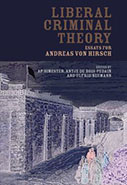Liberal Criminal Theory: Essays for Andreas Von Hirsch

Authors: A.P.Simester, Antje Du Bois-Pedain, and Ulfrid Neumann
Publisher: Oxford, UK; Portland, OR: Hart Publishing, 2014. 406p.
Reviewer: Douglas Husak | November 2014
Liberal Criminal Theory is a Festschrift for Andreas von Hirsch. Even though each of the distinguished contributors recounts von Hirsch’s enormous influence on the field of criminal theory, I would like to begin my review of this wonderful collection by adding my own brief tribute.
Criminal theory, as I (and, I believe, von Hirsch) understand it, is an academic discipline that lies at the intersection of moral philosophy and substantive criminal law, with a dose of criminology and social science added to the mix. This recipe is tweaked in various ways by each of the many specialists in criminal law theory. In his long and distinguished career, von Hirsch’s own blend is noteworthy for explicating (some would say “reviving”) a retributivist or “just deserts” penal philosophy—a research program that endures, with fits and starts, to this very day. Thanks more to von Hirsch than to any other scholar, retributivism (in some form or another) has become the dominant theory of punishment and sentencing throughout much of the world. Although critics of retributivism are legion, it is hard to think of a single legal philosopher who has defended a consequentialist alternative with anything that approximates the care and attention von Hirsch has devoted to just deserts. His pioneering efforts explore many of the messy details of retributivism: how, for example, to justify the increased sentences imposed on recidivists, and how to gauge the seriousness of various crimes and the severity of different modes of punishment for purposes of applying a principle of proportionality. Partly because of his remarkable linguistic proficiency, no contemporary penal theorist has been more successful in shaping debates about punishment and sentencing theory in both North America as well as Europe. Readers who need a more thorough overview of von Hirsch’s central theses can do no better than consult the initial essay written by Andrew Ashworth and Lucia Zedner.
I add a single observation—an observation I hope is not unduly influenced by my own personal affection and professional admiration for von Hirsch. I readily concede that a few criminal theorists possess more conceptual dazzle or are more knowledgeable about the actual mechanics of systems of criminal justice around the world. Some of his more frequent co-authors—especially A.P. Simester and Andrew Ashworth—have helped von Hirsch fill these gaps. In my opinion, however, no living scholar has been right about so many important philosophical positions in punishment and sentencing theory. In addition, no one has succeeded in defending complex theses with prose more clear and simple. Perhaps these judgments simply reflect the impact von Hirsch has exerted on me. Nonetheless, I strongly suspect that legal philosophers who fail to appreciate von Hirsch’s achievements have somehow come to value goods other than truth.
Now for the Festschrift itself. Its seventeen papers are loosely (and somewhat arbitrarily) organized under four general and overlapping headings: [1] Punishment and Prevention; [2] Punishment, Desert and Communication; [3] Rechtsguter, Harm and Offence in Criminalisation; and [4] Criminal Justice in a Liberal State. Although these broad descriptions may appear to be intelligible to anyone with a modicum of experience in substantive criminal law, I doubt that these essays will prove accessible to readers not already steeped in the ongoing philosophical debates. The novice is unlikely to recognize the level of sophistication this book contains. Despite this cautionary remark, the fact that several of these papers were originally written in German is not a reason for speakers of English to steer clear. One of the editors, Antje do Bois-Pedain, has done a superb job of translation.
Many of the contributors to Part One focus on a particular aspect of von Hirsch’s views about how a penal philosophy that is broadly retributive can explain the importance of prevention. In particular, they take issue with his attempt to provide a rationale for the “hard treatment” component of punishment within a “just deserts” framework. Von Hirsch famously alleges that the hard treatment inherent in punishment functions as a supplement to censure, that is, as an extra, prudential incentive to refrain from committing crimes. This incentive merely supplements, but does not supplant the more basic moral reasons against offending. But how can this rationale purport to justify the state’s infliction of hard treatment? Why is the state permitted to harm offenders (as punishments invariably do) in order to give each of us a self-interested reason (supplemental or otherwise) to conform to the law? A number of German theorists take a stab at this difficult issue. After criticizing alternative accounts, Claus Roxin contends that “the duty to subject oneself to the pursuit of punishment’s preventive aims… can be derived straightforwardly from the offender’s culpable performance of a prohibited wrong. This is so because it is a general principle of not just the criminal law, but all law, that a person who brings about harm culpably is responsible for restoring the damage he has done” (37). But why should the content of a duty to restore the damage culpably caused take the form of a duty to undergo hard treatment? Among other problems, the duty to restore such damage presumably is owed to the victims of crime—those who suffer injury to themselves or their property. It is odd to suppose that this duty is discharged when offenders undergo hard treatment, even if they thereby increase the overall deterrent efficacy of the criminal law. In my judgment, the problem of how to defend hard treatment within a retributive penal framework remains unsolved.
Part Two examines issues that arise from von Hirsch’s sensible insistence that punishments convey censure and must be deserved. Julian Roberts and Hannah Maslen pose the novel question of how these demands should be interpreted when defendants engage in commendable or culpable behavior after the commission of their crime. How can anything the offender does after his crime has been completed affect his desert for committing it? Roberts and Maslen argue that some sensitivity to “post-offence conduct” should be taken into consideration even by a sentencing scheme that implements a theory of just deserts. Michael Tonry revisits the troubling question of how deep social disadvantage should affect the severity of the punishment offenders should be made to endure. Even though the intuition is widely shared, the supposition that deprivation somehow bears on culpability is surprisingly hard to support. If the punishment of these unfortunates should be reduced, does the rationale consist in justification, excuse, estoppel, or some novel consideration? Tonry concludes that both retributive and consequentialist considerations militate in favor of mitigating the punishments of deeply disadvantaged offenders.
In the last two decades of his career, von Hirsch’s attention strayed from punishment to criminalization: from the question of how much to the topic of what to punish. This is the subject of Part Three. His central focus has been on applications of the harm principle: what real or hypothetical offenses does it allow or preclude? In particular, he struggled to rescue the harm principle from charges of vacuity or irrelevance: after all, any conduct that a reasonable person has ever proposed to prohibit could be alleged to cause a bad result that might plausibly be described as harmful. In particular, distant and speculative consequences might qualify as “remote harms” and render persons who cause them eligible for penal liability. Moreover, might the harm principle draw the boundaries of the criminal law too narrowly? Should we ever conceptualize conduct as harmful when it is merely offensive?
Quite a few German commentators (Hassmer, Wohlers and, most impressively, Hornle) question whether a theory of criminalization should include the harm principle at all. The current trend among criminal theorists, I believe, is to reject this principle. Only R.A. Duff and S.E.Marshall, however, make substantial efforts to clarify the content of the harm principle itself. They usefully contrast the Harm Prevention Principle (HPP) from the Harmful Conduct Principle (HCP). The former (HPP) states: “We have good reason to criminalise a type of conduct if (and only if) doing so will efficiently prevent harm to others” (206). The latter (HCP) states: “We have good reason to criminalise a type of conduct if [and only if] it is harmful to others” (206). They persuasively argue that many of the reservations von Hirsch expresses about the proscription of remote harms can be expressed more perspicuously if we understand the distinct implications of each principle. Although Duff and Marshall do not argue explicitly for the superiority of HPP to HCP, they modestly conclude that “we cannot rule out in advance the possibility that we can sometimes also contribute to the efficient prevention of harm by criminalizing conduct that is not itself harmful” (215). One might fear that the floodgates to rampant overcriminalization are likely to be opened if we do not require that criminalized conduct must itself be harmful (or at least create a substantial risk of harm). Not so, Duff and Marshall assure us. Conduct should only be punished if it is wrongful, and this constraint blocks a number of otherwise worrisome implications of HPP. Like Duff and Marshall, I readily concur that conduct should not be punished unless it is wrongful. What is most problematic, however, is the argument by which Duff and Marshall purport to show that the wrongfulness constraint is preserved by the criminalization of breaches of effective regulations (220). Controversy about whether and how conduct could possibly become wrongful when it violates a malum prohibitum is not likely to be resolved anytime soon.
The fourth and final part of this volume examines the political dimensions of criminal justice—a topic that still receives too little attention. In particular, almost no criminal theorist in the United States or the United Kingdom pays adequate attention to the role of the police. By contrast, we remain fascinated with the roles of the legislature and the judiciary. But it is at least arguable, according to John Kleinig, that police administer punishments. For a number of reasons, however, Kleinig urges us to “minimise if not discourage” (285) this expansive view of police power.
Liberal Criminal Theory is an outstanding collection of papers that pay tribute to a great and important scholar. Every single article is worth reading, although it is obviously impossible to mention more than a handful in this brief review. Here is a final thought: Completing this book confirmed my suspicion that Anglo-Americans would benefit from paying more attention to their German counterparts, who in turn would profit (perhaps even more greatly) from the interaction. At times, criminal theory seems to unfold in separate but parallel universes. Although the contributors to this volume comprise a “who’s who” of famous legal philosophers in the United Kingdom and the European continent, many of their names will be unfamiliar to criminal theorists in the United States. Andreas von Hirsch has done more than any living theorist to bridge the chasm between the Anglo-American and European debates, but he would be the first to admit that far more work remains to be done. Since the philosophical problems at the foundations of criminalization, political philosophy, punishment and sentencing theory are common to systems of criminal justice throughout the world, it is unfortunate that so many of us remain so parochial.
Douglas Husak is a Distinguished Professor of Philosophy at Rutgers University


